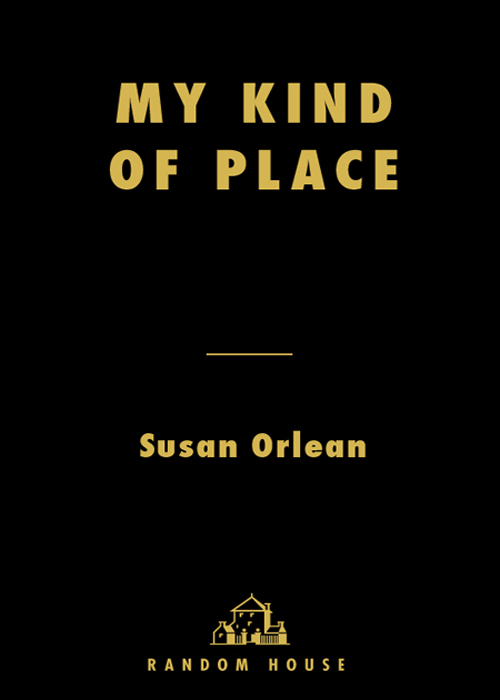
Susan Orlean
MY KIND OF PLACE
Travel Stories from a Woman
Whos Been Everywhere
RANDOM HOUSE  NEW YORK
NEW YORK
Contents
Do We Transcend Before or After We Purchase
the Commemorative Eel Cakes? [MOUNT FUJI, JAPAN]
Introduction
I travel heavy. This is probably something of a surprise, since you might well assume that someone who travels as much as I do would be the sort to throw a T-shirt and a toothbrush into a paper bag and go. Unfortunately, this is not the case. I deliberate endlessly before I travel; I pack and repack; I am shamed by how much Ive packed, and then, as penance, I force myself to remove a few items; then I capitulate, put everything back in, add one or two more things just to be safe, and at last, burdened and beaten, limp to the airport or the train station or the parking garage with my gross overload. Why do I do it? Ive decided that it is a sort of passage I have to make before making my true passageits my ritual of clinging to the familiar before entering the unfamiliar, my resistance to leaving the comforts of home for the displacement of travel, of being a stranger embarking on exploration.
This might make me sound like a reluctant traveler, but Im not at all; Im only a reluctant packer. Im a passionate voyager, and as soon as I can force the locks shut on my overstuffed suitcase, Im eager to head out the door. I love the jolt you get from travel. I love the freshness and surprise of being in a new place, the way it makes even the most ordinary things seem extraordinary and strange. It makes me feel extra-alive. The things that are routine in a familiar place are thrilling somewhere new; things I dont notice at home jump out at me when Im traveling. As soon as I get out of town, I love stopping for gas so I can poke around the gas station minimarket; besides the usual, ubiquitous junk food and cigarettes, there are always odds and ends that reveal the character of the place. Those serendipitous discoveries are my addiction. I found a real raccoon-skin Davy Crockett hat for sale in a gas station in Tennessee; a hand-printed pamphletthe biography of a famous local giantamong the mass-market magazines in a convenience store in Florida; homemade barbecue beside the Doritos and Slim Jims in a minimart in Missouri. These are little tokens of what make all journeys seem so promising, so loaded with possibilityfull of the yet unseen, the impossible to imagine, the still unknown.
Im a sucker for going places that sound wonderful, of course, but Im even enthusiastic about places that dont. This quality sometimes vexes the people around me. Years ago, I had some reporting to do in Houston. I was, as usual, excited about the trip. I mentioned it to a friend of mine who had lived in Texas for a few years, and he warned me that Houston was a drag. I said that I couldnt imagine how it could be, since it was a major city in an interesting state full of interesting industries like oil and gas, and in my opinion that guaranteed that it would be a great place to explore. My friend was disgusted. Believe it or not, he said, there are places in the world that even you wouldnt find interesting. I will confess that he was almost right: Of all the places Ive been, Houston was one of the hardest to love, but its blankness and shapelessness fascinated me and made a great backdrop to the story I had gone there to see.
THIS IS A COLLECTION of pieces about journeys. With one or two exceptions, they arent what are ordinarily described as travel writing; they are not prescriptive or advice giving, and they dont review whether or not you get your dollars worth out of the local hotels. In some cases, these are stories that came about because I was interested in the place itself. For instance, I got the idea to write about Khao San Road in Bangkokthe street where all the backpackers and hitchhikers and hair braiders in the world convergebecause I was in Bangkok changing planes (coincidentally, I happened to be on my way back from reporting another one of these pieces, Fertile Ground, in Bhutan) and had some time to kill. A young couple I had met on the plane had told me a little bit about Khao San, and on a whim I hopped in a cab to take a look. I found it such an amazing scene that as soon as I got home and emptied my suitcase, I packed again and returned to Bangkok to spend a week walking up and down the road. I decided to write about Midland, Texas, because it was being mentioned so oftenand so significantlyas a building block in George W. Bushs personality that it seemed like a place worth understanding and describing in order to have an idea of what sort of building block a place like Midland might be. Likewise, Mt. Fuji loomed: It is so embedded in Japanese semiotics and symbolism that it has always struck me as being less a place than an almost living thing, yet I had no real idea of what it was like as a physical place. When my editors at Outside asked me where in the world Id like to go, Mt. Fuji was the first thing that came to mind. It was also nice to climb a mountain that sounds a lot bigger and more challenging than it really is; of all my travels, it is the one that has afforded me the most extravagant and undeserved bragging rights.
Other stories included here started with narratives, and the places emerged as characters only after my reporting began. When I set out to write about a woman in New Jersey who had twenty-seven or so tigers in her backyard, the operative concept seemed to be tiger, not New Jersey. The tigers were certainly the centerpiece of the story, but I found myself equally interested in the setting and in the idea that when the Tiger Lady had first moved in, her corner of southern New Jersey was wild and empty and remotein other words, the sort of place where you might indeed have a few dozen tigers in your backyard without anyone noticingand that the arc of her troubles followed the arc of the areas development, drawing an almost perfect picture of how rapidly and dramatically a rural place can change. Im not good at fitting my stories into categories, and many of them can be described as any number of thingsprofiles, essays, reporter-at-large, whateverbut these are stories that I think of most in the context of place. When I wrote these pieces, the sense of where I wasof where the stories were unfoldingseemed to saturate every element of the experience, to inform it and shape it, and to be what made the story whole.
TO BE HONEST, I view all stories as journeys. Journeys are the essential text of the human experiencethe journey from birth to death, from innocence to wisdom, from ignorance to knowledge, from where we start to where we end. There is almost no piece of important writingthe Bible, the Odyssey, Chaucer, Ulyssesthat isnt explicitly or implicitly the story of a journey. Even when I dont actually go anywhere for a particular story, the way I report is to immerse myself in something I usually know very little about, and what I experience is the journey toward a grasp of what Ive seen. I picture my readers having the same expedition, in an armchair, as they begin reading one of my pieces and work their way through it, ending up with the distinct feeling of having been somewhere else, whether its somewhere physically exotic or just the somewhere else of being inside someone elses life.
The farthest Ive ever gone for a story was Bhutan, which is on the other side of the world. In fact, since it is literally on the other side of the world, I used one of my trips there to satisfy a lifelong desire: Instead of doing a round trip there and back, I flew around the entire world, stopping in Bhutan in between. The closest travel story Ive ever done is the piece called Homewrecker, in which the roles of visitor and visitee were reversedit is a story about how someone (almost) made a journey into my own home, which was a peculiar experience for someone like me, whose professional life involves going into other peoples houses. The most difficult trip Ive ever taken for a story was probably one that was just a few blocks from home, to Martin Luther King Jr. High School in Manhattan. Even though the person I wrote aboutthe president of the student bodywas a buoyant and witty young woman, the school struck me as a harsh, hard place, ground down and depleted, and what made it difficult was reconciling this with the fact that it was just a few blocks from my very comfortable apartment. The easiest trip Ive taken for a story, hands down, was the one I took to visit three lavish spas in Thailand. I prefer going on my reporting trips alone, and since I often go to unglamorous places like Midland, Texas, and Jackson, New Jersey, I rarely have to fend off friends and family who want to keep me company. In the case of the spa trip to Thailand, though, I had a waiting list of volunteers who told me they were very, very concerned about my taking such a long, difficult trip all alone.
Next page

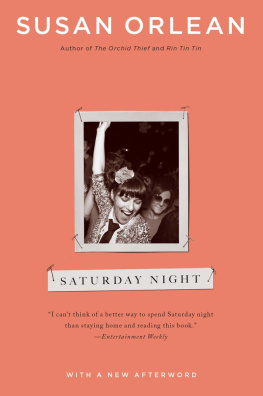
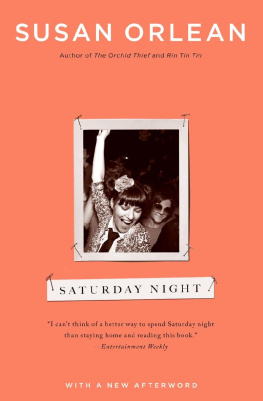
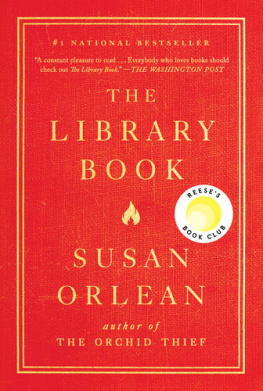

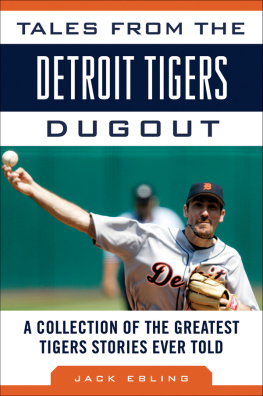
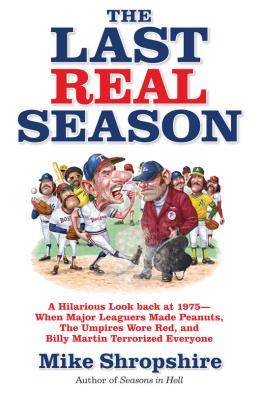
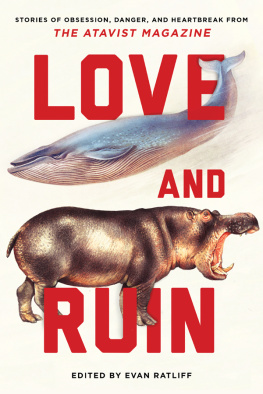


 NEW YORK
NEW YORK